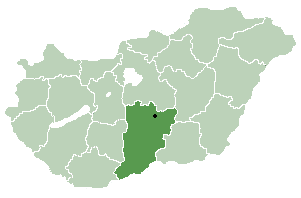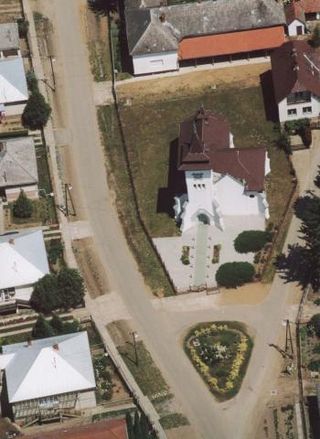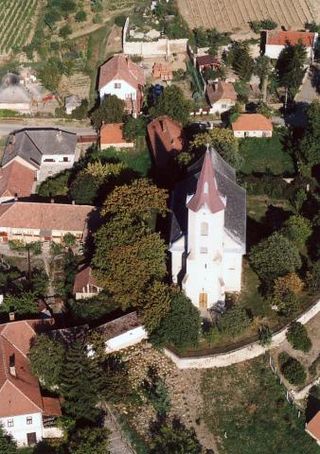
Ladánybene is a village in Bács-Kiskun county, in the Southern Great Plain region of southern Hungary. Few Jews lived in the village until they were murdered in the Holocaust in 1944.

Magyardombegyház is a village in Békés County, in the Southern Great Plain region of south-east Hungary.

Kaszaper is a village in Békés County, in the Southern Great Plain region of south-east Hungary.

Csanádapáca is a village in Békés County, in the Southern Great Plain region of south-east Hungary.

Aranyosapáti is a village in Szabolcs-Szatmár-Bereg county, in the Northern Great Plain region of eastern Hungary. János Pataki, the paternal grandfather of former governor of the State of New York, George Pataki, was from Aranyosapáti.

Baktalórántháza is a town in Szabolcs-Szatmár-Bereg county, in the Northern Great Plain region of eastern Hungary.

Csaroda is a village in Szabolcs-Szatmár-Bereg county, in the Northern Great Plain region of eastern Hungary.

Gelénes is a village in Szabolcs-Szatmár-Bereg county, in the Northern Great Plain region of eastern Hungary.

Gemzse is a village in Szabolcs-Szatmár-Bereg county, in the Northern Great Plain region of eastern Hungary. It is mentioned in archival sources as far back as 1347. For many centuries, until the liberation of the serfs, the land was mainly owned by the Karolyi counts.

Nagyvarsány is a village in Szabolcs-Szatmár-Bereg county, in the Northern Great Plain region of eastern Hungary.

Ramocsaháza is a village in Szabolcs-Szatmár-Bereg county, in the Northern Great Plain region of eastern Hungary.

Petneháza is a village in Szabolcs-Szatmár-Bereg county, in the Northern Great Plain region of eastern Hungary.

Kántorjánosi is a village in Szabolcs-Szatmár-Bereg county, in the Northern Great Plain region of eastern Hungary.

Kisvarsány is a village in Szabolcs-Szatmár-Bereg county, in the Northern Great Plain region of eastern Hungary.

Olcsva is a village in Szabolcs-Szatmár-Bereg county, in the Northern Great Plain region of eastern Hungary.

Márokpapi is a village in Szabolcs-Szatmár-Bereg county, in the Northern Great Plain region of eastern Hungary.

Mátyus is a village in Szabolcs-Szatmár-Bereg county, in the Northern Great Plain region of eastern Hungary.

Tarcal is a village on the eastern edge of Borsod-Abaúj-Zemplén county, northern Hungary, in the famous Tokaj-Hegyalja wine district, 55 km (34 mi) from Miskolc.

The Kamianets-Podilskyi massacre was a World War II mass shooting of Jews carried out in the opening stages of Operation Barbarossa, by the German Police Battalion 320 along with Friedrich Jeckeln's Einsatzgruppen, Hungarian soldiers, and the Ukrainian Auxiliary Police. The killings were conducted on August 27 and August 28, 1941, in the Soviet city of Kamianets-Podilskyi, occupied by German troops in the previous month on July 11, 1941. According to the Nazi German reports a total of 23,600 Jews were murdered, including 16,000 who had earlier been expelled from Hungary.

Tófalu is a village in Heves County, Hungary.










